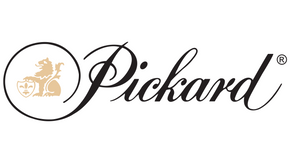
A recent excavation in Antioch, Illinois, uncovered a broken piece of china, which was discarded almost 60 years ago. This partial gravy boat, as the trademark shows, was made for the United States Quarter Master Corp (U.S.Q.M.C.) for the U.S. Navy in March of 1942, some seven months after World War II began. These gravy boats, despite their "clunky" nature, played a pivotal role in Pickard's history. The company had completed its three-year relocation from Chicago to Antioch only six months before the outbreak of the war. Not only was Pickard learning about its new facilities (still home for the company today), but its products were being shifted from hand painting of imported giftware pieces to fine china dinnerware produced exclusively in Antioch.
Eben Morgan, Pickard's former President, believed that the move to Antioch and obtaining the gravy boat contract were two of the most important events in the company's history. "Without those two things happening, Pickard would not exist," said Morgan. "Prior to manufacturing in Antioch, Pickard was totally dependent on decorating imported giftware from both Europe and Japan. Obviously, those imports ceased during the war years. And without the fuel granted for the government contract, Pickard's kilns would have been shut down and the business closed. Perhaps some may not consider gravy boats vital to the war effort, but they kept a lot of people employed during some mighty tough times. Austin Pickard told me if the Navy ran short on shells, they could use those gravy boats as ammunition. They were so heavy they would knock down a building!"
Alan Reed, author of The Collector's Encyclopedia of Pickard China, wrote a short historical account of these times which confirms Eben Morgan's account:
"To maintain its operations through the war, Austin Pickard successfully bid on a Navy contract for gravy boats. These heavy chunks of institutional ware were a far cry from the delicate, sculptured porcelain with which the company had become identified. And while the revenue from the contract was important, the most significant benefit was that as a war material contractor, the company qualified for a fuel oil allotment, and it was the oil that fired the kilns and kept the company alive."
For you readers old enough to remember 1942, Pickard's gravy boats arrived just in time for the U.S. Navy's June victory over the Japanese carrier fleet at Midway. Gasoline was rationed with most people allocated 3 gallons per week. To conserve this precious fuel, speed limits were strictly enforced at 35 mph. The last automobile rolled off the Detroit assembly line early in the year, and none would be built until late 1945. Sugar, tires and many other products were rationed, and 40% of all vegetables were grown in "victory gardens." President Roosevelt's retreat, now known as Camp David, was opened in the Catoctin Mountains of Maryland. (Twenty years ago Pickard made a special dinnerware service for Camp David that is still being used today.) President Roosevelt also initiated the use of aircraft for overseas travel. These presidential planes, now known as Air Force One, are among America's most recognized symbols worldwide, and Pickard is proud to furnish the dinnerware used on this magnificent aircraft since 1988.
Indeed, a lot has happened to our nation and to our company in the past 60 years. The United States has become the shining beacon of freedom to a troubled world, and Pickard has progressed from gravy boats to claim its place as America's Finest China. May both continue to flourish!


